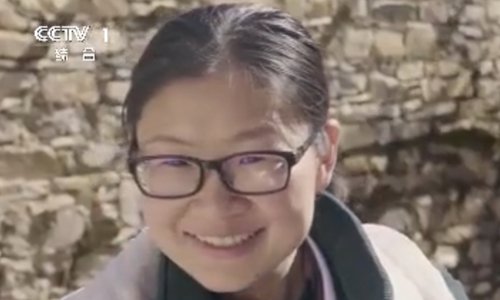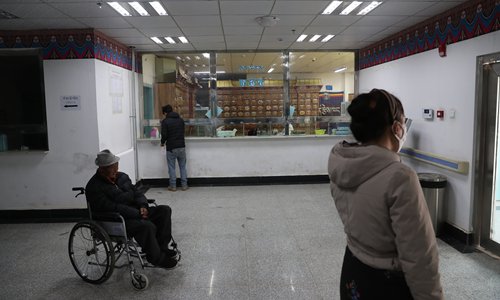HOME >> CHINA
Tributes paid to doctor dedicated to saving lives in Tibet
Source:Global Times Published: 2019/8/9 19:43:39

A file photo of Zhou Nan Photo: Screenshot from CCTV
"If I were in Beijing I would be a respiratory physician, and I would do my scientific research, become a professor, and take walks in the yard after retirement," Zhou Nan once said in an interview. "But a normal life like that is predictable. There are endless unknown things and infinite possibilities in Tibet, and I love the unknown," she said.Zhou's story of how she left an easy life in the city to work in Southwest China's Tibet touched many people.
An obituary released by the Tibet Autonomous Region People's Hospital said that Zhou, deputy director and physician with the hospital's blood rheumatology department, died on August 2 at the age of 37 in Cangxi county, Southwest China's Sichuan Province, the Beijing Daily reported.
Another report by news website thepaper.cn said that Zhou died in a car accident, according to her colleague.
Zhou was awarded the title of "Good doctors in China" by the Chinese National Health Commission, and praised as the "Most Beautiful Doctor" by CCTV in 2017.
Save more lives
In many people's eyes, Zhou could have had a bright future in big cities such as Beijing and Shanghai, as she got her PhD from the Chinese Academy of Medical Science & Peking Union Medical College, China's top medical institute, and spoke multiple foreign languages.
However, she chose another path, stepping onto the plateau and working there for 10 consecutive years.
During those 10 years, Zhou established the first Blood Rheumatology department in Tibet, and trained a group of physicians in the field after she took charge of training in the department.
Zhou had saved an old man dying from pneumonia while travelling to Tibet many years ago, and was shocked by the severe lack of medical resources there.
"I won't make any difference by staying in Beijing, because there are so many doctors there already," Zhou said in the interview. "I can save more lives staying in Tibet," she said.
Zhou suffered severe high-altitude stress when she first arrived in Tibet, but battled through it. She made ward rounds on a daily basis, and saved many dying people from lupus encephalopathy and vasculitis.
Zhou received thousands of patients every year without making a single complaint.
Zhou travelled extensively to remote counties such as Nagqu, Damxung, and Shannan. She visited many tents of herdsmen in these remote areas, worked for doctors' teams stationed in villages, and helped a hospital in Zhangmu, Nyalam county, near the China-Nepal border.
Zhou once treated a 16-year-old boy in Nagqu who was suffering from leukaemia. After the boy's condition improved, the father, who did not speak Putonghua, brought a large bag of mushrooms to Zhou's home and insisted that she accept it.
"I cannot express my gratitude enough. She totally deserves the award," said another of Zhou's patient after she was awarded the "Most beautiful doctor in China, 2017,"
In southwestern Tibet's Xigaze region, a 24-year-old man suffering from purpura had been in critical condition and a coma for a week before Zhou saved him.
"Saving a person's life gives me a great sense of achievement, and makes all my hard work and efforts worthwhile," Zhou said, adding that patients are the biggest motivation for her to stay in Tibet.

The lobby of a hospital in Biru county of Southwest China's Tibet Autonomous Region Photo IC
Standardized training
However, sometimes she also felt that her hands were tied in her work.
In 2013, Zhou and her colleague diagnosed a Tibetan girl with leukaemia, but failed to save her young life due to the absence of related medical departments in the hospital and lack of medical resources.
Zhou then realized that a more professional department should be established to save more lives. She travelled frequently between Tibet and Beijing to seek help from her mentor, Professor Zhang Fengchun, at the rheumatism and immunology department of the Peking Union Medical College Hospital (PUMCH). Zhang soon donated equipment worth 1 million yuan ($143,000) to the Tibet Autonomous Region People's Hospital along with matching medical resources and technical support.
In 2014, a rheumatism and immunology department with complete medical equipment and techniques was established in Tibet, bringing rheumatic immunity treatment to the region for the first time.
On more than one occasion, Zhou made efforts to promote Tibet's overall academic level in rheumatism and immunology. A professional society on rheumatism and immunology was established in Tibet led by Zhou, and she also organized seminars on rheumatism every year.
In order to benefit more patients, she launched many new medical services in Tibet, including auto-antibody detection and bone marrow biopsy.
In 2016, a group of evaluation experts on the standardized training of residents of the Chinese Medical Doctor Association came to Tibet for an inspection, and Zhou's department was chosen to represent the hospital to demonstrate ward checking.
An expert said after the inspection, "After inspecting so many hospitals across the country, it turns out that the most standardized ward checking training is in Tibet."
"You might be as weak as a powerless match in the beginning, but others will be encouraged by your story after you become powerful through your own efforts," Zhou was quoted as saying.
Newspaper headline: Filling the void
RELATED ARTICLES:
Posted in: PROFILE